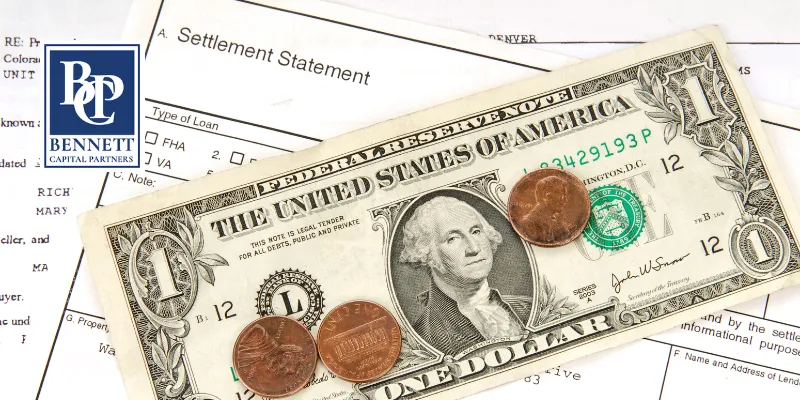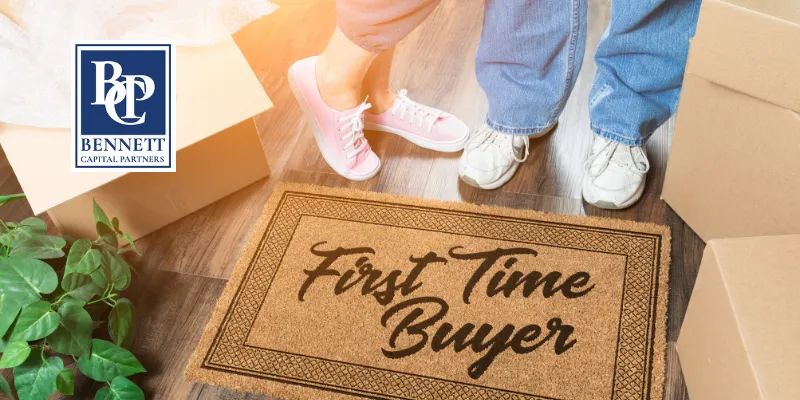Top Tips For First Time Home Buyers
Updated: Sep 16, 2023

Buying your first home can feel like navigating uncharted territory. You're not alone; I too have experienced the dizzying array of decisions to make, from credit checks to down payments. This article is packed with actionable tips and insider advice for first-time home buyers, directly informed by my own journey and thorough research.
Ready? Dive into this guide, because your dream house awaits!
Key Takeaways
✅ Start saving early for a down payment and other associated costs to ease financial burdens along the way.
✅ Determine how much home you can afford by considering your monthly income, expenses, and future financial goals.
✅ Check and improve your credit score to access better mortgage terms and save money over the life of your loan.
✅ Research first-time home buyer assistance programs that offer down payment assistance or lower interest rates.
Quick Navigation - Click the link below to jump to that section..
Preparing to Buy Tips

Start saving early to ensure you have enough for a down payment and other associated costs. Determine how much home you can afford by considering your monthly income, expenses, and future financial goals.
Check your credit report and take steps to improve it if necessary. Research first-time home buyer assistance programs that may offer down payment assistance or lower interest rates. Finally, compare mortgage options and rates to find the best fit for your financial situation.
Start saving early
Embarking on your journey as a first-time homebuyer is exciting, yet it's crucial to prioritize starting your savings early. The cornerstone of this thrilling venture often revolves around the down payment - an initial upfront fraction of the total cost that you pay out of pocket.
Considering that mortgage down payments typically range from 3% to a staggering 20% of the purchase price, initiating your savings plan sooner rather than later will ease financial burdens along the way.
For instance, an FHA loan and VA loans offer smaller down payment possibilities; however, these options might entail other supplemental costs or requirements. So don't let yourself be blindsided by expenses beyond monthly mortgage payments such as property taxes or maintenance fees- save diligently and consistently for a smoother transition into homeownership.
Your future self will thank you for it!
Determine how much home you can afford

Determining how much home you can afford is a crucial step for first-time homebuyers. It goes beyond knowing your monthly mortgage payments, as it involves considering the down payment amount, property taxes, and insurance as well.
Start by reviewing your financial health to assess how much money you have saved for this purpose. The conventional loans may require anywhere from 3% to 10-20% of the home's purchase price as down payment.
Avoid being house poor by factoring in all future costs including renovation or furnishing expenses that are often overlooked during the buying process. Some buyers opt for FHA loans or VA loans, which offer options for smaller down payments which could be an advantage if you're short on upfront funds but remember these come with their own terms and conditions.
Understanding your credit score will also help establish what kind of mortgage lender and mortgage rates that you can expect and thus aid in determining affordability. Paying off any outstanding credit card balances can improve your score, ultimately enhancing your borrowing power.
Determine a comfort zone for potential mortgage payments based on your current income and commitments before starting the hunt for your dream house - it'll keep things realistic and stress-free!
Check and improve your credit

Starting your first-time home buying journey with a comprehensive credit check is imperative. Access your free annual credit reports from all three major agencies, scrutinize each line carefully for potential errors that could drag down your score, and dispute them immediately if found.
Boosting your credit scores also involves paying off outstanding credit card balances or reducing them to about 30% of your available credit - this simple step demonstrates responsible use of credit card debt while positively impacting the overall financial health of yours as reflected in those scores.
A higher scoring profile can yield more desirable mortgage terms, potentially saving you thousands over the life of a loan—an undeniable advantage for every new homeowner navigating the costly waters of property taxes and insurance premiums on top of mortgage payments.
Remember not to open any new credit accounts during this process since lenders might view it as financial instability which may negatively affect your eligibility for competitive market rates.

When you're a first-time home buyer, it's essential to explore the various assistance programs available to you. These programs can provide valuable resources and support to help make purchasing your dream home a reality. Here are some key points to consider when researching first-time home buyer assistance programs:
➡️ Government Programs: Many government agencies offer specific programs designed to assist first-time home buyers. These programs may include down payment assistance, grants, or low-interest loans. Research federal, state, and local programs that might be available in your area.
➡️ FHA Loans: The Federal Housing Administration (FHA) offers loans specifically tailored for first-time home buyers. These loans generally require a lower down payment and more flexible credit requirements compared to conventional mortgages.
➡️ VA Loans: If you're a veteran or an active-duty service member, VA loans offer excellent benefits for first-time home buyers. VA loans often require no down payment and come with competitive interest rates.
➡️ USDA Loans: The United States Department of Agriculture (USDA) provides loans with attractive terms for individuals buying homes in designated rural areas. These loans typically have low-interest rates and may not require a down payment.
➡️ Fannie Mae/Freddie Mac Programs: Fannie Mae and Freddie Mac are government-sponsored enterprises that offer mortgage options specifically targeted at first-time home buyers. These programs often feature low down payment requirements and flexible credit guidelines.
Compare mortgage options and rates
When you're ready to become a first-time homebuyer, comparing mortgage loans, options and rates is a crucial step to ensure you secure the most suitable home loan for your circumstances. Below is a comparison of some mortgage lenders along with their essential features.
Remember, the choice of mortgage lender and the type of mortgage you get will significantly impact your financial future, so take your time to review each lender's offerings and choose wisely.
Gather necessary loan paperwork

When applying for a mortgage, it is crucial to gather all the necessary loan paperwork. This will help streamline the process and ensure a smoother experience. Here are the essential documents you'll need:
✔ Proof of income: Provide copies of your recent pay stubs, W-2 forms, or tax returns to verify your employment and income stability.
✔ Bank statements: Lenders typically require two to three months' worth of bank statements to assess your financial health and see if you have sufficient funds for a down payment and closing costs.
✔ Identification documents: Have a valid driver's license or government-issued ID ready, as well as your Social Security number, for identity verification purposes.
✔ Employment history: Prepare a list of your previous employers, job titles, and dates of employment to demonstrate stable employment history.
✔ Asset documentation: If you have any other assets like stocks, bonds, or real estate properties, provide documentation to support their value and ownership.
✔ Debt information: Disclose any outstanding debts such as student loans, auto loans, or credit card balances so that lenders can calculate your debt-to-income ratio accurately.
✔ Rental history: If you are currently renting, gather records of rent payments and contact information for your landlord to show responsible financial behavior.
Get preapproval letter
Before you start your home shopping journey, it's crucial to get a preapproval letter from a mortgage lender. This letter shows sellers that you are serious about buying and have the financial means to do so.
It also gives you a clear understanding of how much house you can afford, so you don't waste time looking at properties outside of your budget. Additionally, having a preapproval letter in hand puts you in a stronger negotiating position when making an offer on a home.
So make sure to gather all necessary loan paperwork and reach out to lenders early in the process to secure your preapproval letter and increase your chances of finding your dream home.
Bennett Capital Partners makes this easy. To get a pre-approval letter you can fill out their online form here
➡️ GET A PRE-APPROVAL NOW ⬅️
Home Shopping Tips

Choose a reliable real estate agent who understands your needs and can help you find the ideal type of house and neighborhood within your budget.
Choose a reliable real estate agent
Finding the right real estate agent is crucial when you're a first-time homebuyer. It's important to work with someone who has experience and knowledge in the specific area where you want to buy your home.
Look for an agent who understands local market conditions, property values, and neighborhoods. Researching and reading reviews about potential agents can give you insights into their professionalism and track record.
You want to find someone who will listen to your needs and preferences, guide you through the home buying process, and provide valuable advice based on their expertise. Communication skills are also essential – your agent should keep you informed and updated throughout the process.
Define your ideal type of house and neighborhood
When choosing a house and neighborhood, it's important to envision your ideal living situation. Consider factors such as the size of the home, the number of bedrooms and bathrooms, and any specific features or amenities that are important to you.
Think about your long-term needs as well - if you plan on starting or expanding your family, it might be wise to choose a home with extra room to grow. Research potential neighborhoods thoroughly, taking into account property values, property taxes, and safety considerations.
Look for areas that have amenities like schools and entertainment options that align with your lifestyle preferences. And don't forget about the commute! Test out the drive during rush hour if you work away from home to get a realistic sense of what it would be like on a daily basis.
By clearly defining your ideal type of house and neighborhood upfront, you can make more informed decisions throughout the home buying process.
It's crucial to have a clear vision of what you're looking for in terms of both your dream house and neighborhood when embarking on the journey of becoming a first-time homeowner. Determining your ideal type of house involves considering various factors such as its size, number of bedrooms and bathrooms, specific features or amenities desired (which could include things like a backyard or an open floor plan), along with long-term plans such as starting or expanding your family in mind when selecting appropriate space requirements.
Additionally, researching different neighborhoods is essential; delve deep into details regarding property values, taxes associated with properties in those areas (as they vary by location).
Stick to your budget
Sticking to your budget is crucial when shopping for a home as a first-time buyer. It's easy to get swept up in the excitement of finding your dream house, but it's important to resist the temptation to overspend.
By setting a realistic budget and sticking to it, you can ensure that you won't find yourself in financial trouble down the line. Consider not only your monthly mortgage payments but also other expenses such as property taxes, insurance, utilities, and maintenance costs.
It's wise to leave some breathing room in your budget for unexpected expenses or future plans like renovations or starting a family. Remember, buying a home is a long-term commitment, so it's essential to choose one that fits within your financial means while still meeting your needs and desires.
Make the most of walk-throughs and open houses
Walk-throughs and open houses are invaluable opportunities for first-time homebuyers to gather information and make informed decisions. Here's how you can maximize your experience:
Take your time: Don't rush through a walk-through or an open house. Spend ample time exploring each room, examining the layout, and envisioning yourself living in the space.
Ask questions: Don't hesitate to ask the seller's agent or the homeowner questions about the property. Inquire about any recent renovations, maintenance issues, or potential concerns you may have.
Inspect carefully: Use this opportunity to thoroughly inspect the property's condition. Look for signs of wear and tear, water damage, mold, or any other potential issues that may require costly repairs down the line.
Take measurements: Bring a measuring tape with you to measure rooms, doorways, and windows. This will help ensure that your furniture will fit comfortably in your new home.
Visualize potential upgrades: If certain aspects of the property don't meet your preferences or style, imagine how these areas could be improved or renovated according to your taste.
Get a feel for the neighborhood: Walk around the neighborhood during an open house to get a sense of its atmosphere and amenities. Pay attention to factors such as proximity to schools, public transportation, parks, and shopping centers.
Document your visit: Take photos or videos during walk-throughs and open houses so you can later review the properties at your own convenience. This will also help jog your memory when comparing different options.
Keep notes: Write down any important details or observations about each property on a notepad or in a homebuyer's journal. This will make it easier to compare homes later on and make an informed decision.
Home Purchasing Tips

When purchasing a home, it's crucial not to skip the home inspections and negotiate with the seller to ensure you're getting the best deal. Also, don't forget to purchase adequate home insurance for added protection.
Don't skip home inspections
Getting a home inspection is an absolute must when buying your first house. It's an opportunity to uncover any potential issues or repairs needed before making the final decision. While it may seem tempting to skip this step, doing so could cost you dearly in the long run.
A standard inspection will cover the basics, but it's important to note that it won't test for radon, mold, or pests. Consider investing in additional inspections if necessary. Attending the home inspection allows you to observe and ask questions about any concerns you may have regarding the property.
This knowledge gives you the power to make informed decisions and safeguards against unexpected surprises down the road.
Negotiate with the seller
During the home buying process, negotiating with the seller can be a crucial step in saving money and securing a favorable deal. By engaging in negotiations, you have the opportunity to address any repairs or issues that may arise during inspections and potentially reduce closing costs.
Depending on market conditions, you may also have some leverage when it comes to the final purchase price. It's important to work closely with your real estate agent who can guide you through this process and help you navigate negotiations effectively.
Remember, negotiating power can vary depending on local market conditions, so having an experienced real estate agent by your side is invaluable.
Purchase adequate home insurance
As a first-time homebuyer, one crucial aspect you shouldn't overlook is purchasing adequate home insurance. Home insurance is not just an option; it's typically required by lenders when buying a home.
This insurance protects your investment and covers the cost of repairing or replacing your home and belongings in case of damage or loss due to events like fire, theft, or natural disasters.
It's essential to consider factors such as the overall condition of the property, its location, and any potential risks in the area when selecting the right coverage for your needs.
Additionally, keep in mind that different policies offer varying levels of coverage. To ensure you're adequately protected, take into account factors like replacement value versus actual cash value coverage options and consider additional endorsements if necessary.
Remember that while price is important, it's equally important to focus on finding reliable insurers with good customer service reputations who will be there for you when you need them most.
Be Prepared for the Mortgage Process

Get preapproved for a mortgage, understanding your loan options, and don't forget about closing costs. Save physical copies of your paperwork.
Get preapproved for a mortgage
One crucial step in the home buying process is getting preapproved for a mortgage. This involves contacting mortgage lenders and providing them with your financial information so they can determine how much money they are willing to lend you.
By getting preapproved, you not only gain a clear understanding of your budget but also increase your chances of securing a home loan when you find the perfect property. Additionally, being preapproved shows sellers that you are serious about purchasing a home and can give you an advantage in competitive markets.
Remember, different types of loans have varying down payment requirements, interest rates, and terms, so it's essential to explore all your options before committing to one lender or type of loan.
➡️ GET A PRE-APPROVAL NOW ⬅️
Understand your loan options
When it comes to buying your first home, understanding your loan options is crucial. There are various types of loans available, such as FHA loans, VA loans, and conventional loans. Each option has its own set of requirements and benefits.
For example, FHA loans are ideal for buyers with a lower credit score or smaller down payment, while VA loans cater specifically to veterans and offer favorable terms. Conventional loans, on the other hand, tend to have stricter eligibility criteria but provide more flexibility in terms of property type and loan amount.
By understanding these different options and consulting with a mortgage lender or loan officer, you can make an informed decision that best suits your financial situation and goals. Remember to consider factors like interest rates, monthly payments, closing costs, and any available assistance programs when comparing loan options.
Don't forget about closing costs
Closing costs are an important aspect of the home buying process that first-time buyers often overlook. It's crucial to remember that in addition to saving for a down payment, there will be various fees associated with closing on your new home.
These costs typically include appraisal fees, title insurance fees, and attorney fees, among others. The amount you'll need to budget for closing costs can vary depending on factors such as the location of the property and the type of mortgage loan you choose.
To ensure you're prepared financially, consult with your mortgage lender or broker to understand the specific closing costs you'll be responsible for. Being aware of these potential expenses will help you plan and budget accordingly throughout the entire mortgage process.
To get an exact estimate of costs. Please give us a call 305-407-0747 one of our professionals can walk you through the closing costs that you would expect to see.
Save physical copies of your paperwork
As a first-time homebuyer, it's crucial to stay organized throughout the homebuying process. One important step is to save physical copies of all your paperwork. Here's why:
✔ Proof of Income: Keep copies of your recent pay stubs and any additional income documentation. Mortgage lenders will require this information to evaluate your loan eligibility.
✔ Bank Statements: Save physical copies of at least three months' worth of bank statements. These statements show your financial stability and provide evidence of your down payment funds.
✔ Tax Returns: Hold onto copies of your tax returns for the past two years. Lenders often request these documents to assess your income and ensure you're capable of repaying the loan.
✔ Credit Reports: Maintain printed copies of your credit reports from all three major credit bureaus (Experian, Equifax, TransUnion). These reports are essential for identifying any errors or discrepancies that may affect your creditworthiness.
✔ Insurance Policies: Safeguard physical copies of any insurance policies you already have, such as auto or renter's insurance. Your mortgage lender may require proof of homeowner's insurance before finalizing the loan.
✔ Purchase Contracts: Make sure to keep a hard copy of the signed purchase agreement for the house you intend to buy. This contract outlines crucial details about the property and protects both parties involved.
Work with a Real Estate Agent

Working with a real estate agent is one of the smartest decisions you can make as a first-time home buyer. These professionals have the expertise and experience to guide you through the complex process of buying a home.
They can provide valuable insights into the local market, helping you find properties that meet your specific needs and budget.
A good real estate agent knows how to negotiate on your behalf, ensuring that you get the best price and terms for your new home. They will handle all the paperwork and walk you through each step, making sure nothing falls through the cracks.
With access to a wide range of properties, they can show you homes that may not be available online.
Remember, buying a home is likely one of the biggest financial investments you'll make in your lifetime. Working with an experienced real estate agent ensures that this investment is protected and made with confidence.
So don't hesitate to reach out to a trusted professional who can help turn your dream house into a reality.
Negotiate with the Seller

When it comes to buying your first home, negotiating with the seller is a crucial step in securing a favorable deal. This process can potentially save you money on repairs or closing costs and help ensure that you're getting the best value for your investment.
The key to successful negotiations lies in understanding the local market conditions and being well-informed about the property and its neighborhood.
Before entering into negotiations, it's important to gather information on comparable properties in the area to get an idea of their selling prices. This knowledge will provide leverage during negotiations and help you make informed decisions about what price range is reasonable for the property you're interested in.
Attending the home inspection is another opportunity for negotiation. Identifying any potential issues, such as electrical or plumbing problems, can give you grounds to request repairs or adjustments to the purchase price.
Remember, negotiating power may vary depending on whether it's a buyer's or seller's market, so staying up-to-date with current real estate trends and working closely with an experienced real estate agent can greatly improve your chances of securing a favorable deal.
Home Inspection

Getting a thorough home inspection is one of the most crucial steps in the home buying process. It's your opportunity to assess the condition of the property and identify any potential issues before finalizing the home purchase.
During a standard home inspection, an inspector will thoroughly evaluate the structure and mechanical systems of the house. However, it's important to note that certain things like radon, mold, or pests may require additional inspections.
To ensure a comprehensive assessment, make sure that your home inspector has access to every part of the house, including roof spaces and crawl areas. Attending the inspection yourself can also be beneficial as it provides you with a better understanding of any problems identified and allows you to ask questions directly to the inspector.
Keep in mind that findings from a home inspection can serve as leverage for negotiation with the seller. Depending on what is discovered during this process, you may be able to negotiate repairs or even lower closing costs.
Remember though that market conditions play a role here; consulting with an experienced real estate agent can help you develop an effective strategy based on local conditions.
Lastly, don't forget about homeowner's insurance! Lenders typically require it and having coverage protects against unforeseen circumstances that could result in costly repairs or replacements down the line.
Additionally, consider purchasing an umbrella policy which covers your major assets such as your home and cars - giving you peace of mind in case something unexpected happens.
By prioritizing proper inspections and being proactive about protecting your investment through insurance policies, first-time buyers can navigate this significant milestone more confidently
Conclusion

In conclusion, buying a home for the first time can be an exciting yet overwhelming experience. By following these tips for first time home buyers, such as saving early, researching assistance programs, and working with an experienced real estate agent, you can navigate the process with confidence.
Remember to consider your budget and credit score, explore mortgage options, and prioritize home inspections. With careful planning and preparation, you'll be well on your way to finding your dream home and making it a reality.
FAQs

What are the top tips for first time home buyers?
First-time home buyers should start by understanding their budget and credit score. It's also crucial to get pre-approved for a mortgage, research the housing market, and work with a trusted real estate agent. Don't forget to consider additional costs like insurance and property taxes, and always have a home inspection before finalizing the purchase.
What should first time home buyers know about mortgages?
First-time home buyers should understand the different types of mortgages available, such as fixed-rate and adjustable-rate mortgages. They should also be aware of the importance of a good credit score in securing a favorable interest rate. It's essential to understand the terms of the mortgage, including the interest rate, the term length, and whether there are any penalties for early repayment.
How can first time home buyers navigate the housing market?
First-time home buyers can navigate the housing market by doing thorough research on the areas they're interested in, including checking the local housing market trends, understanding the neighborhood's amenities, and comparing prices of similar homes in the area. Working with a knowledgeable real estate agent can also provide valuable insights and guidance.
What are common mistakes made by first-time home buyers?
Common mistakes made by first-time home buyers include not setting a realistic budget, skipping the home inspection, not getting pre-approved for a mortgage, and letting emotions drive the decision-making process. It's important to avoid these pitfalls by doing thorough research, seeking professional advice, and taking a pragmatic approach to home buying.

Philip Bennett
Philip is the owner and Licensed Mortgage Broker at Bennett Capital Partners, Bus. NMLS # 2046828. He earned his degree in Accounting and Finance from Binghamton University and holds a Master's Degree in Finance from NOVA Southeastern University. With more than 20 years of experience, Philip has been a leader in the mortgage industry. He has personally originated over $2 billion in residential and commercial mortgages.
Learn more about Philip Bennett's background and experience on our Founder's page. Whether you're a first-time homebuyer or a seasoned real estate investor, our team is here to help you achieve your real estate goals. Don't wait any longer, contact us today and let us help you find the right mortgage for your needs.
Discover helpful tips and tricks on mortgages by reading our blog posts
First-time Homebuyer's Guide To Getting A Mortgage to learn more about first-time homebuyer mortgage programs. Click here to read the full article
